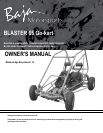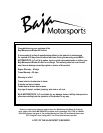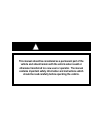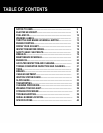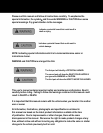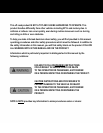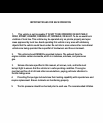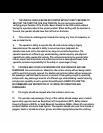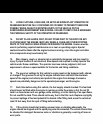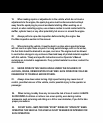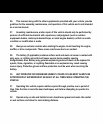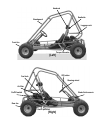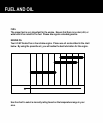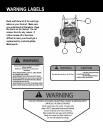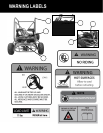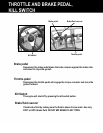
5
NOTICE TO USERS
7. THE VEHICLE SHOULD NEVER BE STARTED WITHOUT FIRST CHECKING TO
SEE THAT THE THROTTLE IS IN IDLE POSITION. Do not start engine without
verifying proper function of the throttle. Never attempt to start this vehicle without
having the operator seated in the proper position. When starting with the operator in
the seat, the operator should have their left foot on the brake.
8. This vehicle is not designed or intended for racing, any form of competion, or
use on metal tracks.
9. The operator’s ability to operate this off-road vehicle safely is largely
dependent upon the operator’s ability to excercise proper judgment. An
operator also must not be too small or too large for controlled operation. The
operator must be of sufcient age, understanding, mental capacity, and physical
capability to safely operate this vehicle. This vehicle should only be operated after
mature, supervised instruction and sufcient practice in decongested areas. Safe
operation includes responsibility for the safety or a passenger (if any).
10. A DOUBLE SEAT VEHICLE IS DESIGNED FOR ONE OPERATOR AND ONE
PASSENGER. No one should ever attempt to ride on this vehicle without being seated,
with the seat belt properly secured. For double seat vehicles ridden without passenger,
the passenger seat belt must be secure to prevent it from getting caught in operating
components. Any passenger must be of sufcient age, understanding, mental capacity,
and physical capability to act to protect himself/herself. ALWAYS FOLLOW THE
RECOMMENDED AGE RESTRICTION OF 16 YEARS FOR OPERATORS AND
PASSENGERS.
11. The engine should be stopped when the vehicle is not in use.
12. The operator and passenger (if any) of this vehicle should always wear a helmet
approved by agencies such as Department of Transportation (DOT), Safety Helmet
Council of America (SHCA), or Snell Memorial Foundation (SNELL). Most off-road vehicle
accident fatalities are due to head injuries. The operator should also wear face shields or
goggles, boots or closed-toe shoes, gloves, and other appropriate protective clothing.



